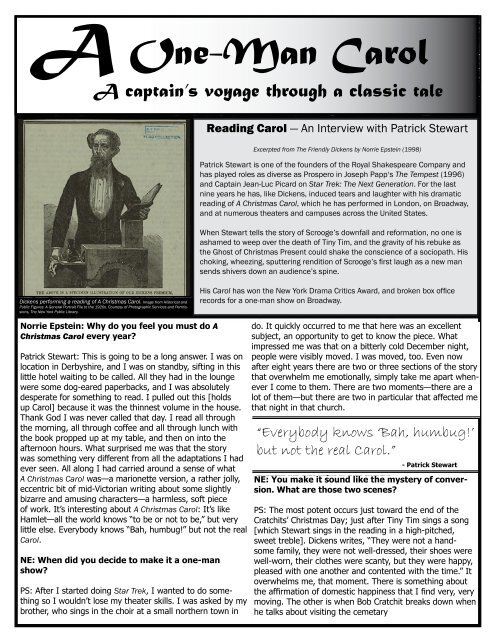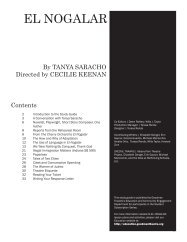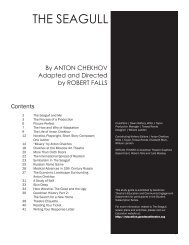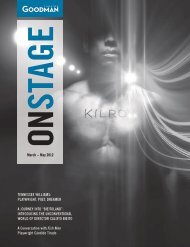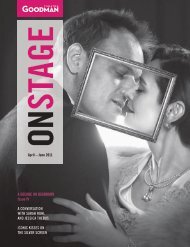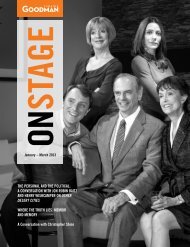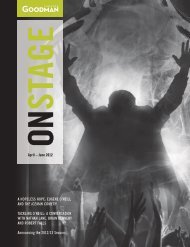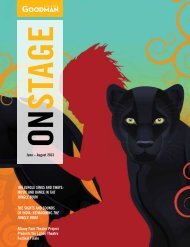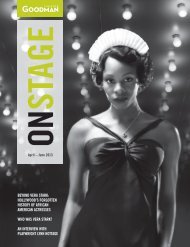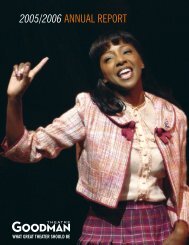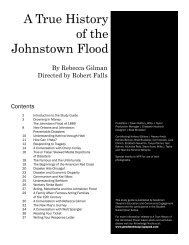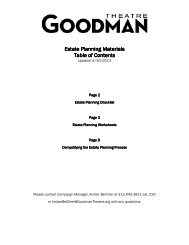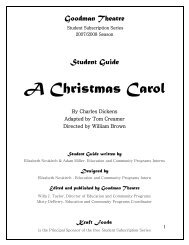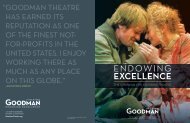A Christmas Carol Study Guide.indd - Goodman Theatre
A Christmas Carol Study Guide.indd - Goodman Theatre
A Christmas Carol Study Guide.indd - Goodman Theatre
Create successful ePaper yourself
Turn your PDF publications into a flip-book with our unique Google optimized e-Paper software.
A One-Man <strong>Carol</strong><br />
A captain’s voyage through a classic tale<br />
Reading <strong>Carol</strong> — An Interview with Patrick Stewart<br />
Excerpted from The Friendly Dickens by Norrie Epstein (1998)<br />
Patrick Stewart is one of the founders of the Royal Shakespeare Company and<br />
has played roles as diverse as Prospero in Joseph Papp‘s The Tempest (1996)<br />
and Captain Jean-Luc Picard on Star Trek: The Next Generation. For the last<br />
nine years he has, like Dickens, induced tears and laughter with his dramatic<br />
reading of A <strong>Christmas</strong> <strong>Carol</strong>, which he has performed in London, on Broadway,<br />
and at numerous theaters and campuses across the United States.<br />
When Stewart tells the story of Scrooge’s downfall and reformation, no one is<br />
ashamed to weep over the death of Tiny Tim, and the gravity of his rebuke as<br />
the Ghost of <strong>Christmas</strong> Present could shake the conscience of a sociopath. His<br />
choking, wheezing, sputtering rendition of Scrooge’s fi rst laugh as a new man<br />
sends shivers down an audience’s spine.<br />
Dickens performing a reading of A <strong>Christmas</strong> <strong>Carol</strong>. Image from Historical and<br />
Public Figures: A General Portrait File to the 1920s. Courtesy of Photographic Services and Permissions,<br />
The New York Public Library.<br />
His <strong>Carol</strong> has won the New York Drama Critics Award, and broken box offi ce<br />
records for a one-man show on Broadway.<br />
Norrie Epstein: Why do you feel you must do A<br />
<strong>Christmas</strong> <strong>Carol</strong> every year?<br />
Patrick Stewart: This is going to be a long answer. I was on<br />
location in Derbyshire, and I was on standby, sifting in this<br />
little hotel waiting to be called. All they had in the lounge<br />
were some dog-eared paperbacks, and I was absolutely<br />
desperate for something to read. I pulled out this [holds<br />
up <strong>Carol</strong>] because it was the thinnest volume in the house.<br />
Thank God I was never called that day. I read all through<br />
the morning, all through coffee and all through lunch with<br />
the book propped up at my table, and then on into the<br />
afternoon hours. What surprised me was that the story<br />
was something very different from all the adaptations I had<br />
ever seen. All along I had carried around a sense of what<br />
A <strong>Christmas</strong> <strong>Carol</strong> was—a marionette version, a rather jolly,<br />
eccentric bit of mid-Victorian writing about some slightly<br />
bizarre and amusing characters—a harmless, soft piece<br />
of work. It’s interesting about A <strong>Christmas</strong> <strong>Carol</strong>: It’s like<br />
Hamlet—all the world knows “to be or not to be,” but very<br />
little else. Everybody knows “Bah, humbug!” but not the real<br />
<strong>Carol</strong>.<br />
NE: When did you decide to make it a one-man<br />
show?<br />
PS: After I started doing Star Trek, I wanted to do something<br />
so I wouldn’t lose my theater skills. I was asked by my<br />
brother, who sings in the choir at a small northern town in<br />
do. It quickly occurred to me that here was an excellent<br />
subject, an opportunity to get to know the piece. What<br />
impressed me was that on a bitterly cold December night,<br />
people were visibly moved. I was moved, too. Even now<br />
after eight years there are two or three sections of the story<br />
that overwhelm me emotionally, simply take me apart whenever<br />
I come to them. There are two moments—there are a<br />
lot of them—but there are two in particular that affected me<br />
that night in that church.<br />
“Everybody knows ‘Bah, humbug!’<br />
but not the real <strong>Carol</strong>.”<br />
- Patrick Stewart<br />
NE: You make it sound like the mystery of conversion.<br />
What are those two scenes?<br />
PS: The most potent occurs just toward the end of the<br />
Cratchits’ <strong>Christmas</strong> Day; just after Tiny Tim sings a song<br />
[which Stewart sings in the reading in a high-pitched,<br />
sweet treble]. Dickens writes, “They were not a handsome<br />
family, they were not well-dressed, their shoes were<br />
well-worn, their clothes were scanty, but they were happy,<br />
pleased with one another and contented with the time.” It<br />
overwhelms me, that moment. There is something about<br />
the affirmation of domestic happiness that I find very, very<br />
moving. The other is when Bob Cratchit breaks down when<br />
he talks about visiting the cemetary<br />
39


